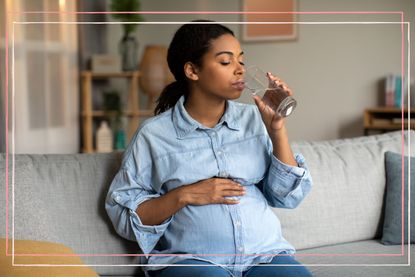Experiencing hot flashes in pregnancy? Here's what to do and how to cool down comfortably
A midwife and an obstetrician and gynaecology consultant shared their advice with us about what to do if you are experiencing hot flashes in pregnancy and how to soothe symptoms at home


If you experience hot flashes in pregnancy, don’t worry, it’s perfectly normal and it’s something many people will deal with whilst pregnant.
Also known as hot flushes, hot flashes are one of a myriad of pregnancy symptoms – which can often include pregnancy cravings and pregnancy heartburn. Hot flushes can appear as early as in the first 20 weeks of pregnancy, but can also be experienced at any point while you are pregnant and even in the first month postpartum as well.
While hot flashes in pregnancy are generally more uncomfortable than concerning, you should still inform your midwife if you are experiencing them and ensure that you don’t have a fever instead. Your midwife or GP can help check that you don’t have a fever if you are unsure or worried.
We spoke to Dr Ayanthi Gunasekera, obstetrician and gynaecology consultant and medical information lead at London Gynaecology, and midwife Marley Hall, who shared their advice for expectant mums and natural ways you can try to cool down during pregnancy to help ease your hot flashes.
What causes hot flashes in pregnancy?
Many – but not all – pregnant people will experience hot flashes in pregnancy, just like not all women will get hot flushes during the menopause. It really does depend on the individual.
"Hot flushes are a symptom we normally associate with menopause. It is when you experience a sudden sensation of excessive heat, mainly the face, neck and chest. Excessive sweating can also accompany this phenomenon," explains Dr Ayanthi Gunasekera. "It is also a symptom of pregnancy and is reported in over a third of cases during pregnancy and in the postpartum period."
Midwife Marley told us, "It's very common to get hot flashes in pregnancy; sometimes it's one of the first symptoms a woman gets. They are usually caused by hormonal changes (sudden changes in oestrogen and progesterone levels), and increased blood flow in the body, causing your temperature to elevate slightly. The extra blood can rush to the face giving you a red, flushed appearance."
GoodtoKnow Newsletter
Parenting advice, hot topics, best buys and family finance tips delivered straight to your inbox.
"Hot flashes can occur during pregnancy and are considered normal for many women,” reassures Dr Gunasekera. "Hot flushes are a result of hormonal changes driven by your pregnancy. These changes lead to an increase in the blood supply to the skin and result in a rise in body temperature."
Hot flashes can begin very early and occur at any time during the pregnancy.
What to do if you experience a hot flash in pregnancy
Dr Gunasekera reassures that it's perfectly normal to experience hot flashes during pregnancy - so try not to be alarmed. "Hot flushes are not harmful but you should inform your midwife of any symptoms that are bothering you," Dr Gunasekera advises. "They will be able to reassure you. Your midwife will also be able to check that you are not having a fever which is a sign of an underlying infection and may need treatment."
How to soothe a hot flash during pregnancy and ease symptoms
As medication is neither available nor advisable for hot flashes in pregnancy, your best bet is to take practical steps to avoid getting overheated. As a flush can strike at any time, making small changes to your lifestyle early on could be immensely useful. “Hot flushes may come and go throughout pregnancy so it's good to be prepared!” says midwife Marley.
Midwife Marley and Dr Gunasekera recommend the following steps to help soothe a hot flash during pregnancy:
- Wear loose clothes made from natural fibres such as cotton and linen
- Wear layers so you can remove clothing quickly if you suddenly feel hot
- Keep well hydrated by increasing your fluid intake – drinking more water always helps! Keep a water bottle to hand, along with ice chips.
- Apply ice packs or cold towels to your pulse points (such as temples / back of the neck) to cool down
- Stay in the shade
- Keep your room cool
- Use a room fan at night so you're less likely to overheat
- Take cool or tepid showers
- Avoid triggers such as spicy food and hot drinks
- Carry a fan or an electric hand fan in case a hot flash hits you whilst out and about
When to see a doctor about hot flashes in pregnancy
While uncomfortable, hot flashes in pregnancy and night sweats aren't usually anything to worry about. However, if you have any concerns you should talk to your GP or health visitor.
"Hot flashes can occur during pregnancy and are considered normal for many women but if it is distressing you, please discuss it with your doctor or midwife so they can rule out any other underlying medical issues," says Dr Gunasekera.
If you feel consistently hot, you may have a temperature. In this instance, use a thermometer to check your temperature. Pregnancy charity Tommy's recommends that if the reading is 37.5°C (99.5°f) or above, you should speak to your GP immediately or call NHS 111.
Answers to frequently asked questions about hot flashes in pregnancy
Can you get hot flashes in early pregnancy?
Yes, you can get hot flashes in early pregnancy as well as throughout your pregnancy and even postpartum.
"Not everyone gets them, but for those that do, they can start as early as around the time your period is due – sometimes before knowing you're pregnant," says Marley.
One study examining the appearance of hot flushes throughout pregnancy found that as many as 18% of women developed hot flashes within the first 20 weeks. In total, 35% reported hot flashes at some point throughout their pregnancy, and 29% experienced them postpartum.
"While they typically peak in the third trimester, hot flashes can appear at any point during the course of pregnancy. A study found that 10% of women reported hot flashes within the first postpartum month," says Dr Gunasekera.
How to deal with hot flashes at night during pregnancy
Hot flushes at night during pregnancy - or night sweats - are also common postnatally – again, due to hormone fluctuations after giving birth. This is a natural hormonal response as your body adapts to all the changes it's been through. Dr Gunasekera recommends: "Wear loose clothes made from natural fibres, dress in layers, use a sheet instead of a duvet, use a fan and have cold shower before bedtime."
Disclaimer
The information on GoodTo.com does not constitute medical or other health advice or diagnosis and should not be used as such. Although GoodtoKnow consults a range of medical experts to create and fact-check content, this information is for general purposes only and does not take the place of medical advice. Always seek the guidance of a qualified health professional or seek urgent medical attention if needed.
Our experts

Dr Ayanthi Gunasekera is an obstetrician and gynaecology consultant and medical information lead at London Gynaecology. She received her medical degree in 2006 from the University of London and has been fully registered with the General Medical Council since 2007.

Marley is a registered midwife, author and mother of five children including a set of twins. Marley has practised midwifery in various settings throughout London and Surrey, covering both the NHS and private sectors.
Recent updates
This article was originally published on December 3rd 2021 and was updated on April 9th 2024 to ensure that all information is up to date and reflects current expert advice on the topic.

An internationally published digital journalist and editor, Rachael has worked for both news and lifestyle websites in the UK and abroad. Rachael's published work covers a broad spectrum of topics and she has written about everything from the future of sustainable travel, to the impact of the coronavirus pandemic on the world we live in, to the psychology of colour.
- Debra WatersFreelance Lifestyle Writer
-
 I tested the Lakeland Dual Basket air fryer and it made midweek family cooking a breeze
I tested the Lakeland Dual Basket air fryer and it made midweek family cooking a breezeYou can’t go wrong with the dual basket air fryer by Lakeland complete with easy-view windows to ensure burnt food is a thing of the past…
By Jessica Dady Published
-
 Reframing one simple habit could get your sex life back on track after having a baby, new research shows
Reframing one simple habit could get your sex life back on track after having a baby, new research showsMany parents struggle to get their sex life back on track after having a baby, but new research has shown how one simple habit could make all the difference.
By Ellie Hutchings Published